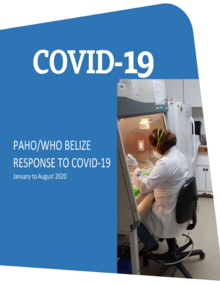INTRODUCTION
The outbreak of the novel coronavirus (COVID-19) was first reported in Wuhan, China on December 31, 2019. On January 30, 2020, the virus was declared a Public Health Emergency of International Concern (PHEIC). And on February 11, 2020, it was named COVID-19, short for ‘coronavirus disease 2019’. One month later, on 11 March 2020, with ongoing community transmission occurring simultaneously in several countries, the World Health Organization (WHO) declared COVID-19 a pandemic.
Between March 23 and April 13, Belize reported 18 positive cases for COVID-19 and 2 fatalities. The Ministry of Health implemented established public health approaches including strict shutdown measures, early diagnosis, isolation, and contact tracing.
Non-pharmacological preventive interventions such as hand hygiene, physical distancing, respiratory etiquette, and the use of masks were also promoted. Additionally, statutory instruments defining physical distancing and the use of masks were enacted. As a result, the country reported no new cases for 53 days.
With the controlled repatriation of Belizeans who had been effectively locked out of the country when the borders closed, however, a few cases of COVID-19 started to be reported starting on June 5. Despite the threat of penalization including three months imprisonment, illegal border crossings which started to be reported around the same time also added to the number of confirmed cases.
On June 30, the state of emergency ended as did curfew and restrictions on non-essential movement. Eager to stimulate economic activity, tourism businesses started offering packages at reduced prices. A month later, an increased number of cases started to be reported, first in a tourism destination than in the rest of the country. As a result, the number of reported cases went from 48 (July 31) to 1,007 (August 31); similarly, case fatalities went from 2 to 13 persons during the same period.
The primary reasons for containment were the following:
• Limiting human-to-human transmission
• Early identification, isolation, and care for patients
• Communicating critical risk information to all communities and countering misinformation
PAHO/WHO has spared no effort in working closely with the Ministry of Health and other ministries including the Ministry of Foreign Affairs and the Ministry of Human Development, other partners and stakeholders, and the UN System in responding to this pandemic.
Besides participating in a coordinated multisectoral national response, in early February 2020, the PAHO/WHO Belize Country Office created an Incident Management Team based on a similar construct at its Headquarters. With support from all levels of the organization, PAHO/WHO’s COVID-19 response activities have been aligned to the nine (9) pillars of the WHO COVID-19 Country Preparedness and Response Plan (CPRP).
|

